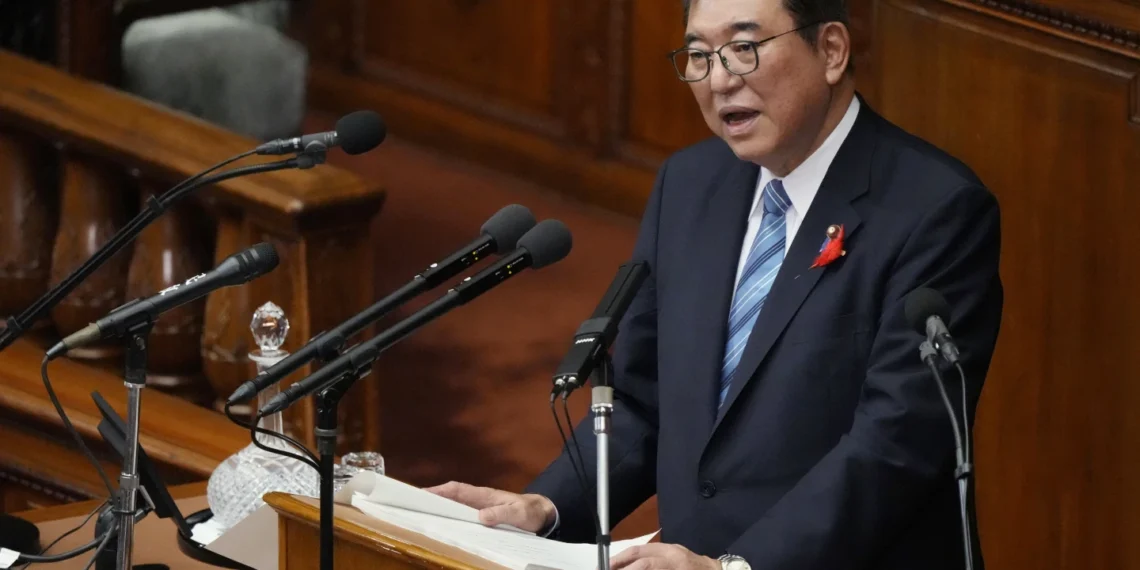New Japanese Prime Minister, Shigeru Ishiba has delivered his first policy speech in office.
Ishiba replaced Fumio Kishida.
He set five policy pillars to uphold, including security, economy and disaster resilience.
Ishiba said that he will bolster Japan’s military capability to defend itself from threats from China, Russia and North Korea under the framework of the Japan-U.S. security alliance.
He noted that violations of Japanese airspace last month by Chinese and Russian warplanes and North Korea’s advancing missile technology and testing as examples of the worsening security environment that Japan faces and stressed the need for a further buildup of Japan’s military.
He promised to promote a strategic, mutually beneficial relationship with China and increase communication on all levels to build “stable and constructive” ties.
He also said he will further strengthen and expand Japan’s ties with South Korea and the trilateral cooperation Japan has with it and the United States.
Additionally, he called the Japan-U.S. security alliance a cornerstone of Japanese diplomacy and security as well as the foundation of peace and prosperity in the Indo-Pacific region and international society.
On the economy, Ishiba said in his speech that he wants workers to have sustainable salary increases that exceed inflation, and will promote investment to create “a virtuous cycle of growth and distribution.” He promised economic support for low-income households and measures for regional revitalization and disaster resilience.
Ishiba said that he has asked ministers to formulate an economic relief package to ease the bite of inflation.
Despite earlier supporting a phasing out of nuclear power following the Fukushima nuclear plant disaster, he pledged to maximize the use of nuclear energy and push for geothermal and other renewable sources to meet the soaring electricity needs of data centers in the age of AI.
He did not mention two goals he advocated before taking office — making the Japan-U.S. security alliance more equitable and establishing a NATO-like collective defense system in Asia — apparently to avoid controversy ahead of the election that the LDP must win.
Omitting those goals also saves him from possibly irking Washington, but may disappoint those who saw him as willing to speak up even when he risked disagreement with his own party.
Ishiba Bemoans Looming Demographic Crisis
Moreover, Ishiba touched to Japan’s population challenges, calling the birth rate situation a “quiet emergency.”
He added that the government will promote measures to support families, such as flexible working hours.
Japan, like many developed countries, is facing a looming demographic crisis as its population ages and the birth rate stays stubbornly low.
According to the World Bank, the country has the world’s oldest population after Monaco.
Last year, its birth rate; the average number of children a woman is expected to have in her life, stood at 1.2, well below the 2.1 children needed to maintain the population.
Ishiba also weighed in on the death of eligible male heirs to the imperial throne.
Male-only succession rules mean the imperial family is facing extinction, with only one young heir: Emperor Naruhito’s 18-year-old nephew Prince Hisahito.
The emperor’s daughter Princess Aiko, 22, is barred from the throne under the Imperial Household Law, in place since 1947.
“Stable royal succession is extremely important. Stabilizing the number of members of the Imperial Family is a particularly urgent issue,” Ishiba told parliament, calling for active debate on the issue.
However, opposition leaders have criticized Ishiba for rushing to hold an election after only adding a new face and fresh image to the party without any concrete results.
He plans to dissolve parliament next Wednesday for an election on October 27, allowing only a few days of debate on his policies.
READ ALSO: Stonebwoy Implores Government To Stop Galamsey Menace




















